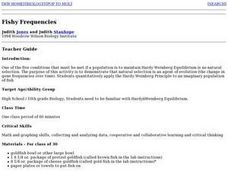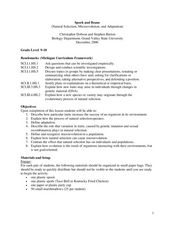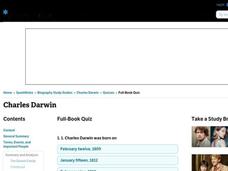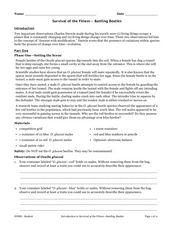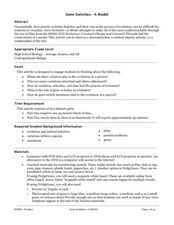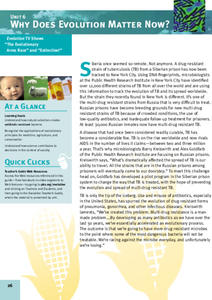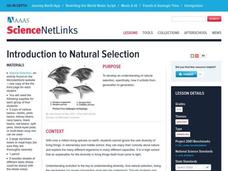Curated OER
Scavenger Hunt: A Group Collection
Students be complete a collection of living organisms and systems from the school campus.
Curated OER
PRIMATE CLASSIFICATION: Evolution, Cladograms,
Students transfer examples (names) of primates from their location in an outline hierarchy of primate groups into a set of nested boxes reflecting that same hierarchy. A cladogram can then be drawn illustrating how these groups are...
Curated OER
Mimicry: An Example of Adaptation
Students are able to explain the relationship between adaptation and ability for survival and reproduction. They are able to give examples of a series of adaptations that would support the idea that evolution is a series of minor...
Curated OER
Fishy Frequencies
Tenth graders demonstrate that natural selection is an agent of evolution. They quantitatively apply the Hardy-Weinberg Principle to an imaginary population of fish. They utilize math and graphing skills, collecting and analyzing data,...
Curated OER
Spork and Beans
Learners examine natural selection, how it works and how it can cause microevolution. In this evolution lesson students complete a lab activity that shows the effects that natural selection has on organisms.
Curated OER
Clipbirds
Students attempt to pick up various objects with a wide variety of beaks, including scissors, spoons, etc.
Curated OER
They're more evolved that way
Students explore the notion of local evolution, or genetic selectivity among different continent-based human populations. They consider specific examples of local evolution, such as lactose tolerance, skin color, and cognitive capacity,...
Curated OER
Charles Darwin
In this online interactive history quiz worksheet, students respond to 45 multiple choice questions about the accomplishments of Charles Darwin. Students may submit their answers to be scored.
Curated OER
Survival of the Fittest -- Battling Beetles
Students experiment with traits. In this Science lesson, students test the strength of beetles using M&M candies in lieu of the insects. Students use the Hardy-Weinberg Equation to calculate possible offspring traits of further...
Curated OER
Gene Switches- A Model
Learners explore genetic variation within a population. In this genetic adaptation lesson, students investigate the reasons contributing to genetic adaptation. Learners collaborate and analyze DNA models. Multiple resources are provided.
Curated OER
The Chips Are Down: A Natural Selection Simulation
Learners, in teams, use different colored paper chips to represent prey and a piece of fabric as the environment.
Curated OER
How Did Humans Evolve?
Young scholars complete an online activity in which they examine fossils to find possible hominid family trees.
Curated OER
Mystery : Structure of the Atom-A Case for Indirect Evidence
Students investigate the structure of the atom through hands on activities. In this atomic structure lesson, students perform 4 activities showing indirect evidence of the structure of the atom and the parts of the atom. They also list...
Curated OER
Why Does Evolution Matter Now?
Young scholars examine how natural selection creates antibiotic-resistant bacteria,
recognize applications of evolutionary principles for medicine, agriculture, and conservation, and discuss how science contributes to decisions in...
Curated OER
Why Do People Fall in Love?
Students discuss human behavior, sexual selection and the underlying genetic and evolutionary reasons for mate selection. The, in groups, they rate the attractiveness of certain individuals and measure facial features for symmetry.
Curated OER
Human Evolution
Students recognize that achievements of human beings throughout human history can be considered part of the ongoing story of human evolution. They research settings such as the biosphere and Mars and write imaginative short stories using...
Curated OER
The Six Kingdoms
In this evolution instructional activity, students will determine the evolutionary relationships among organisms using cladograms and phylogenetic diagrams. This instructional activity has 13 short answer questions and 3 multiple choice...
Curated OER
The Big Bang-Hubble's Law
In this Hubble's law worksheet, students use data for galaxies which include their distance and speed. Students make a graph to show the distance to each galaxy and the speed of each galaxy. They use their graph to answer 4 questions...
Curated OER
Classroom Cladogram of Vertebrate/Human Evolution
Students build a Colossal Classroom Cladogram of vertebrate evolution. After putting it together, they show the gradual, mosaic accumulation of the traits which we, as humans, possess.
Curated OER
How Does Evolution Work?
High schoolers investigate how natural selection influences evolution. They complete a hands-on lab simulation of natural selection, and replicate a real experiment and examine the interplay between selection factors in a population of...
Curated OER
Examining the Fossil Record
Students create an evolutionary tree based on fossil morphology and their ages. In this fossil record lesson plan, students are given 23 pictures of fossil. They study their morphology and arrange the fossils by age and structures on a...
Curated OER
Introduction to Natural Selection
Students develop an understanding of natural selection, specifically, how it unfolds from generation to generation. They work in small groups to perform an experiment using beans. They use a worksheet imbedded in this plan to guide their...
Curated OER
Human Evolution
Students investigate hominid evolution to learn the difference between a relative and an ancestor. They study the emergence of bipedalism and the related physical adaptations and cultural ramifications, and chart patterns of hominid...
Curated OER
Selection and Variation in the Egyptian Origami Bird
Students investigate genetics and evolution of species. They simulate the breeding of birds using origami birds. In addition, using dice they introduce genetic variation into the species.





